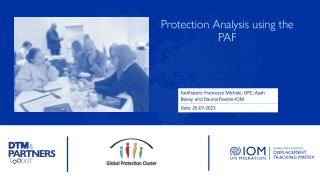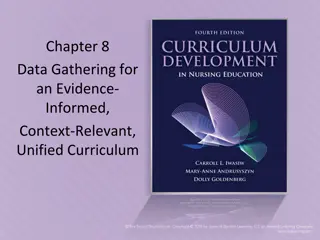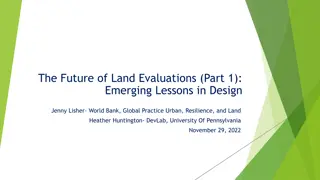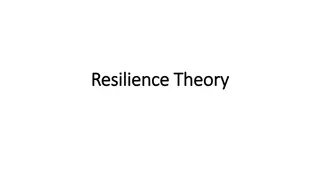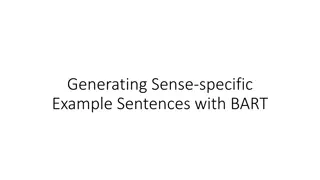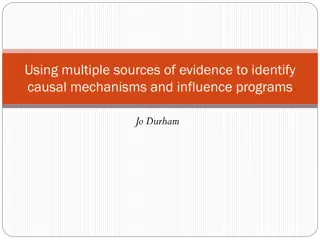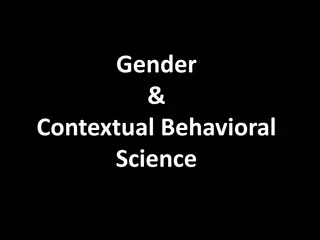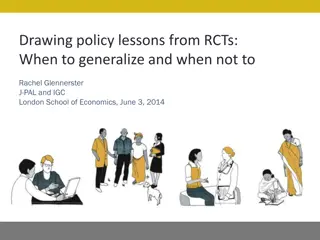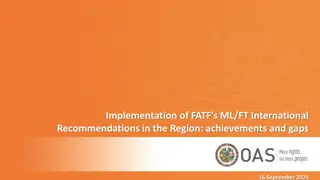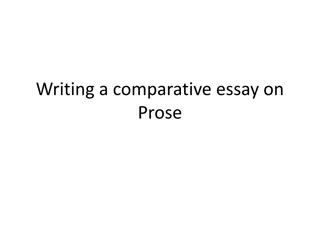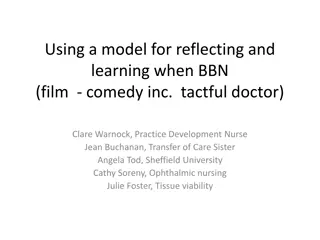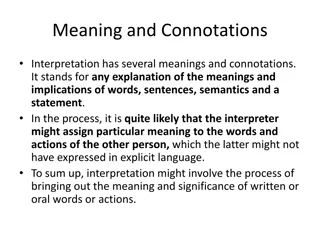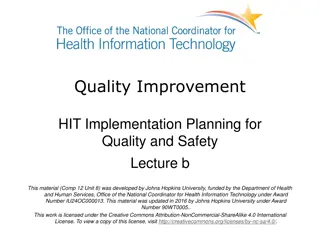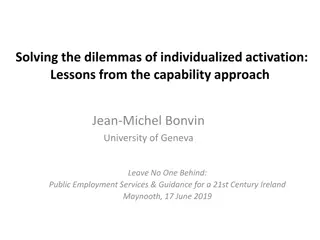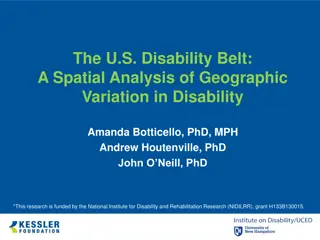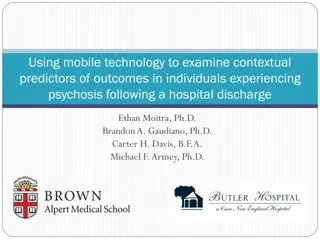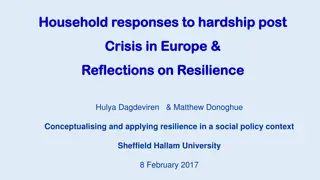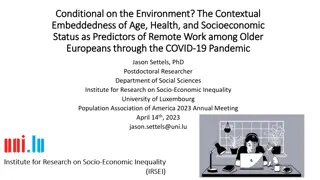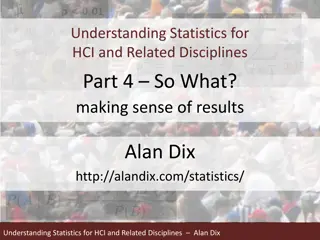Evolution of Film Adaptations: From Silent Cinema to Modern Innovations
The moving picture industry emerged in the 1890s, paving the way for adaptations of literary works in the early 1900s. With the advent of sound, a new era of adaptations began, leading to experiments and innovations in modern filmmaking. Adaptation is a process of adjusting and presenting a work in
8 views • 23 slides
Protection Analysis using the PAF
In this session, participants will learn how to utilize the Protection Analysis Framework (PAF) and its tools to conduct effective protection analysis. The session covers an overview of PAF, understanding its pillars, and analyzing data to comprehend essential protection concepts. Key points include
5 views • 48 slides
Understanding Contextual Factors in Curriculum Development
This chapter delves into the significance of internal and external contextual factors in shaping curriculum development. It discusses the process of gathering essential contextual data, identifying relevant sources, and integrating data to create an evidence-informed, context-relevant, unified curri
5 views • 31 slides
The Main Factors That Influence the Consumer Buyer Behavior
Consumer buyer behavior is influenced by various factors such as cultural, social, personal, and psychological elements. Culture, social factors like family and opinion leaders, personal factors such as age, occupation, lifestyle, and personality, as well as psychological factors like motivation, pl
2 views • 8 slides
Effective Pre-Teaching Vocabulary Strategies for ELs
ELs benefit from specific pre-teaching vocabulary strategies such as selecting important words, providing contextual understanding, offering student-friendly definitions, and engaging in oral interactions. Massachusetts Department of Elementary and Secondary Education emphasizes the importance of ch
2 views • 7 slides
Understanding Contextual Safeguarding in Multi-Agency Working
This workshop aims to assist multi-agency practitioners in developing Contextual Safeguarding approaches through team activities and discussions. The session covers partnership working outside the home, the ecological approach of Contextual Safeguarding, and an exercise on creating safety in various
0 views • 26 slides
Unseen Poetry Revision: Exploring Literary Texts, Devices, and Contexts
Delve into the world of unseen poetry revision by analyzing literary texts, exploring poetic devices, and understanding contextual factors associated with Victorian Literature. Engage in vocabulary challenges, pre-reading activities, and discussions to enhance your understanding of poetry. Enhance y
3 views • 24 slides
Understanding Discourse Analysis: Formal Links and Contextual Connections
Discourse analysis involves examining language beyond grammar rules, focusing on formal links within sentences and contextual connections outside of language. Guy Cook discusses how formal features shape discourse meaning and how verb forms influence sentence coherence. The use of parallelism in spe
3 views • 22 slides
Insights on Land Evaluations: Lessons and Challenges in Design
Exploring emerging lessons and gaps in land evaluations, this content delves into the impacts of land tenure interventions on agriculture, economic outcomes, and environmental sustainability. The discussion highlights key findings, such as the positive effects of formalization on agricultural land b
2 views • 13 slides
Understanding Political Theory through a Contextual Approach
Exploring G.H. Sabine's perspective on political theory through a contextual approach, emphasizing the importance of historical context and societal influences. Sabine argues that while political theory evolves with its contemporary politics, it should be analyzed within its specific time and social
0 views • 9 slides
Insights from WJEC A Level English Literature Examiners' Report
Examiners noted candidates' strengths and weaknesses in analyzing poetry pre-1900 and unseen poetry. Candidates lacked confidence in discussing form and contextual influences, but some effectively integrated these aspects. Responses to individual poems were detailed, with contextual focus crucial in
3 views • 18 slides
Understanding Resilience Theory and Resiliency Framework
Resilience theory focuses on the capacity to recover quickly from difficulties, while the resiliency framework considers a strengths-based approach to understanding child and adolescent development. It explores how positive contextual, social, and individual factors known as Promotive Factors can he
0 views • 10 slides
Exploring Contextual Ideas in Frankenstein by Mary Shelley
An analysis of contextual ideas related to the study of Frankenstein by Mary Shelley. Delve into the key connotations, connections with other literary texts, and the enduring resonance of a novel written almost 200 years ago. Understand the significance of the contexts in which literary texts are wr
0 views • 57 slides
Exploring the Similarities Between Goldiamond's Work and CBS Approaches
Israel Goldiamond's work in professional development, ethics, and behavior analysis shows similarities with CBS approaches, emphasizing contextual factors, functional analyses, and long-term goals. Both approaches focus on understanding behavior within its context and promoting positive change throu
3 views • 5 slides
Motivating Patients on Smoking Cessation: A Contextual Approach Overview
Explore behavioral interventions for smoking cessation, gain insights into effective brief interventions, and learn to apply them using real-world examples. Understand the challenges in tobacco management in primary care and discover common strategies to support patients in quitting smoking. Embrace
0 views • 19 slides
Generating Sense-specific Example Sentences with BART Approach
This work focuses on generating sense-specific example sentences using BART (Bidirectional and AutoRegressive Transformers) by conditioning on the target word and its contextual representation from another sentence with the desired sense. The approach involves two components: a contextual word encod
0 views • 19 slides
Utilizing Multiple Sources of Evidence for Program Evaluation
This presentation by Jo Durham discusses the methodological framework for evaluating programs, focusing on causal mechanisms. It explores how participant reasoning and program resources combine to influence program success at different levels. The discussion also covers the impact of household livel
0 views • 36 slides
Semi-Automatic Ontology Building for Aspect-Based Sentiment Classification
Growing importance of online reviews highlights the need for automation in sentiment mining. Aspect-Based Sentiment Analysis (ABSA) focuses on detecting sentiments expressed in product reviews, with a specific emphasis on sentence-level analysis. The proposed approach, Deep Contextual Word Embedding
0 views • 34 slides
Understanding Gender and Behavioral Science
Exploring the nuances of gender, this content delves into the variance among genders, the impact of gender on behavior, and societal issues related to gender discrimination. It challenges the binary view of gender and highlights the performative spectrum influenced by culture, language, biology, and
0 views • 18 slides
Making Informed Policy Decisions: Lessons from Randomized Controlled Trials
Policy makers face challenges in decision-making without complete evidence. Drawing on a Bayesian approach to evidence, combining different forms of evidence, and considering contextual factors can aid in designing effective policy interventions. Case studies like non-cash incentives for immunizatio
0 views • 18 slides
Assessing Implementation of FATF ML/FT Recommendations
Explore the assessment and effectiveness of implementing FATF's ML/FT International Recommendations in the region, analyzing technical compliance, risk factors, and contextual integration. Learn about the rating system, inputs to effectiveness analysis, and ratings for effectiveness levels.
0 views • 19 slides
Policy Implications of Research on Contextual Factors Affecting Urban Development
Explore the impact of contextual factors on urban development, presenting research findings, policy implications, and recommendations. The presentation covers motivations, research questions, methodology, data analysis, and key findings to aid policymakers in enhancing urban planning strategies.
0 views • 12 slides
Comparative Analysis of Death and Gender Stereotypes in Prose
Explore the presentation of death and gender stereotypes in literary texts, analyzing how authors convey these themes in unique ways. Consider contextual factors and the impact of gender roles on characters' experiences with mortality.
0 views • 9 slides
Ecological Factors and Climatic Influences on Plant Life
Ecological factors play a crucial role in shaping the environment for organisms to thrive. This includes living (biotic) and non-living (abiotic) components like climatic factors, edaphic factors, topographic factors, and biotic factors. Climatic factors such as light, temperature, water, wind, and
0 views • 14 slides
Study Guide for "Merchant of Venice" - Key Contextual Information and Analysis Points
Explore the key moments and contextual information of "Merchant of Venice" to enhance your understanding of the play. Delve into themes such as patriarchy, money lending, anti-Semitism, and more. Learn about the significant characters and events, along with analysis points to enrich your interpretat
0 views • 12 slides
Reflective Model for Improving Healthcare Communication
Utilizing a reflective model in healthcare settings allows professionals to analyze past events, identify areas for improvement, consider contextual factors, and examine personal actions. The model helps in avoiding self-blame, promoting positive reflection, and exploring potential changes for bette
0 views • 21 slides
Understanding Pragmatics: The Study of Language in Social Interaction
Pragmatics, a subfield of linguistics, focuses on the factors influencing language choice in social contexts. It differentiates between semantic and pragmatic information, emphasizing the relationship between language use, context, and the effects on communication. The study of pragmatics delves int
0 views • 20 slides
Seminar on Baby Removal Prevention Project: Insights and Solutions
This seminar delves into recent trends and contextual factors affecting removal practices, particularly among Māori communities. It explores strategies to prevent removals of infants at birth or shortly after, emphasizing the importance of addressing societal inequities. With a focus on organizatio
0 views • 27 slides
Unveiling the Art of Interpretation: From Textual Meanings to Contextual Significance
Interpretation delves into the meanings and implications of words, sentences, and classical texts, bringing out their significance. It involves decoding complex ideas, separating temporal and perennial thoughts, and revealing contemporary relevance. Different approaches like textual and contextual a
0 views • 18 slides
HIT Implementation Planning for Quality and Safety Lecture
This material, developed by Johns Hopkins University and funded by the Department of Health and Human Services, focuses on HIT implementation strategies for quality and safety improvement. It covers topics such as big bang vs. staggered approaches, go-live support, maintenance strategies, contextual
0 views • 23 slides
Understanding Factors and Prime Factors in Mathematics
Explore the concept of factors and prime factors through practical scenarios involving Jedward, stationary supplies, and school choirs. Learn how to find factors of numbers like 18 and 30, identify prime numbers, write numbers as products of prime factors, determine common factors, and calculate low
0 views • 19 slides
Lessons on Individualized Activation and Public Employment Services
Insights on implementing individualized activation strategies using the capability approach, focusing on real freedom, valuable job opportunities, and avoiding paradoxes in public policies. The lessons emphasize the importance of considering individual and contextual factors, adjusting program conte
0 views • 6 slides
Techniques for Passage Comprehension
Techniques such as understanding, summarizing, and contextual analysis are essential for effective passage comprehension. In your own words, summarizing key points, and deciphering contextual questions play a vital role in grasping the content fully. By utilizing these methods, you can enhance your
0 views • 46 slides
Contextual GAN for Image Generation from Sketch Constraint
Utilizing contextual GAN, this project aims to automatically generate photographic images from hand-sketched objects. It addresses the challenge of aligning output with free-hand sketches while offering advantages like a unified network for sketch-image understanding. The process involves posing ima
0 views • 21 slides
Geographic Analysis of the U.S. Disability Belt
A spatial analysis of the U.S. Disability Belt, funded by NIDILRR, explores the clustering of disability prevalence in specific regions like Appalachia and the Southeast Coastal Plains. The research aims to understand contextual factors influencing disability distribution and identify high-risk clus
0 views • 20 slides
Contextual Predictors of Psychosis Outcomes Post-Hospital Discharge
This study explores predictors of outcomes in individuals with psychosis post-hospital discharge using mobile technology. It addresses treatment nonadherence, the impact of antipsychotics, psychological flexibility, and the use of ecological momentary assessment (EMA). The research highlights the cr
0 views • 27 slides
Exploring Household Responses to Hardship in Times of Crisis
Investigating household responses to hardship in post-crisis Europe with a focus on agency, implications for resilience research, and qualitative methods. The seminar aims to understand how households navigate challenges and the contextual factors influencing their strategies.
0 views • 15 slides
Conditional on the Environment? The Contextual Embeddedness of Age, Health, and Socioeconomic Status as Predictors of Remote Work among Older Europeans through the COVID-19 Pandemic
This study delves into how the COVID-19 pandemic has influenced remote work patterns among older Europeans, focusing on the interaction between age, health, socioeconomic status, and contextual factors. It explores the impact of government restrictions, education, income, age, and health on the abil
0 views • 24 slides
Understanding Statistics for HCI and Related Disciplines - Making Sense of Results
Alan Dix delves into the importance of looking beyond simple statistical calculations in HCI research. Emphasizing the significance of analyzing raw data, questioning anomalies, and considering contextual factors, the author highlights the complexity of drawing meaningful conclusions from statistics
0 views • 32 slides
Importance of Contextual Lead-Ins in Incorporating Quotes
When incorporating quotes in your SAR or body paragraph, it's crucial to provide a contextual lead-in. This means introducing the quote with a summary derived from the text itself. Examples from Bradbury's work illustrate how contextual lead-ins enhance the understanding and relevance of quoted pass
0 views • 6 slides

